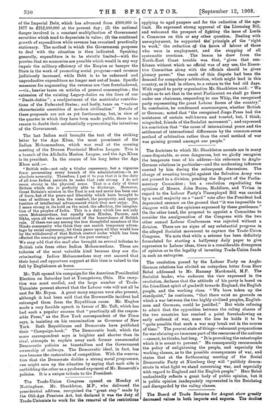The Trade-Union Congress opened on Monday at Nottingham. Mr. Shackleton,
M.P., who delivered the presidential address, recognised the "great step" made by the Old-Age Pensions Act, but declared it was the duty of Trade-Unionists to work for the removal of the restrictions applying to aged paupers and for the reduction of the age- limit. He expressed strong approval of the Licensing Bill, and welcomed the prospect of fighting the issue of Lords v. Commons on this or any other question.... Dealing with unemployment, he supported the principle sof the "right to work," the reduction of. tha hours of labour of those who were in employment, and the stopping of all systematic overtime. The lesson be drew from the North-East Coast trouble was that, "given that con- fidence without which no official was of any use, the Execu- tive Committee along with the officials should be given' plenary power." One result of this dispute had been the demand for compulsory arbitration, which might lead in this country, as it had in others, to a return to the bad old days. With regard to party organisation Mr. Shackleton said : "We ought so to act that in the next Parliament we shall go there under one chairman, responding to one Whip, the recognised party representing the great Labour forces of the country." In conclusion, he condemned scaremongers, whether British or German; noted that "the recognised Jingo Press had the assistance of certain well-known and trusted, but, I think, misguided, friends of the Socialist movement"; and expressed his conviction that "the cause of international peace and the settlement of international differences by the common-sense method of arbitration rather than the cruel method of war was gaining ground amongst our people."










































 Previous page
Previous page